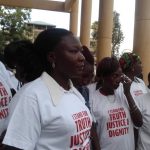Originally published on Citizen Digital
On December 10, the High Court in Nairobi is scheduled to finally deliver a decision on Petition 122 of 2013, which seeks to secure justice for survivors of sexual and gender-based violence during the 2007/2008 post-election violence.
This is a dramatic development in a case that has languished in the court for more than seven years and addresses grave violations which took place more than 13 years ago.
After all these years, the case is the last chance at justice for survivors of the sexual violence that roiled Kenya after the election.
It is the last remaining effort to hold the Kenyan government responsible for its failure to prevent or mitigate the violence, to investigate and prosecute the crimes, and to provide meaningful reparations for survivors.
The eight survivors who came forward for this case – six women and two men – have waited far too long.
According to a report jointly published by Physicians for Human Rights, the Office of the United Nations High Commissioner for Human Rights, and UN Women, sexual violence has been a significant feature of elections in Kenya since the early 1990s.
While historically there had been limited documentation of election-related sexual violence, that changed in the months following contested elections in December 2007.
The chaos and violence that ensued was horrific and marked by widespread gang rape, forced witnessing, forced circumcision, and other heinous acts that targeted women and men, girls and boys.
The Commission of Inquiry into Post-Election Violence (the Waki Commission) was subsequently established to document the numerous human rights violations and support a national reckoning.
The Commission documented more than 900 cases of sexual and gender-based violence during the 2007/2008 post-election period, but this number represents only the “tip of the iceberg,” as many survivors did not come forward to report their experiences – a result of stigma, fear of retaliation, and lack of access to health and psychological services.
Despite the ubiquity of sexual violence during and following the elections, the Government of Kenya has failed in its responsibility – under both domestic and international law – to safeguard the rights of survivors.
The Police Service failed to pursue genuine and prompt criminal investigations into sexual violence reports, and the government has conducted few if any prosecutions in connection with election-related sexual violence emanating from the 2007/2008 period.
The ongoing failure of the government to hold both state and non-state perpetrators – the security forces, gangs, and others who committed these crimes – accountable has caused a profound injustice to the survivors.
In 2013, Physicians for Human Rights – an international human rights organization whose Kenya office I lead – joined eight survivors of the post-election sexual violence and three Kenyan civil society organizations to file a landmark petition.
This constitutional suit seeks to hold Kenya’s attorney general, director of public prosecutions, inspector general of police, independent police oversight authority, and others to account for their failure to prevent, protect, and prosecute cases of sexual and gender-based violence from the 2007/2008 post-election violence period.
Given the overwhelming barriers and risks, it took enormous courage for these survivors to come forward to seek their day in court.
Every time I speak with the survivors – who must remain anonymous due to the risks of violence and retribution they face – I am in awe of their remarkable bravery, resilience, and grit.
On December 10, their trauma should be recognized, their dignity affirmed. The High Court in Nairobi must order reparations for their ordeals, and finally hold those responsible for these acts accountable.
Petition 122 of 2013 underscores the survivors’ plight, the gravity of sexual violence, and the effects of the terrible experiences they underwent. These women and men are still suffering the consequences and after-effects today, even as they seek justice.
The case emphasizes the survivors’ fundamental rights and freedoms that were violated, including the right to dignity, security of the person, equality before the law, and effective remedy due to the government’s inaction.
The petition is also an opportunity for the domestic courts to address systemic violations and crimes against humanity, like the widespread sexual violence cases that occurred during the post-election period, which rise to the level of international crimes under human rights law.
In the seven years since this petition was filed in the High Court in Nairobi, the case has experienced numerous setbacks, procedural delays, and five different presiding judges, all hampering a prompt resolution.
The excessively long period for this case to be heard and determined is in itself a violation of the survivors’ right to access justice. In the quest for accountability, survivors needs are paramount.
The continued wait for judgment is an affront to those survivors who filed this petition, exemplifying the maxim that justice delayed is justice denied.
The case reminds us of the singular role that the government should play to support proper planning and coordination among different actors to ensure people are safe from sexual violence, that survivors can access safe spaces, and that professionals like clinicians, police officers, lawyers, and judges can be trained to better respond to, investigate, prosecute, and adjudicate cases of sexual violence with survivor-centered, trauma-informed approaches.
With the 2022 presidential election looming, now is the time for the government to adopt concrete measures and plans to end Kenya’s vicious cycle of election-related sexual violence. That starts with a full accounting of what went wrong in 2007 and reparations for survivors of those crimes.
The High Court has finally scheduled the judgment day in this consequential case and, remarkably, it falls on December 10 — International Human Rights Day.
Our hope is that the judgment will offer meaningful validation and closure for the eight survivors. Their fundamental human rights should be upheld.
And may the case serve as a beacon of hope for other survivors, in Kenya and around the world, who seek justice and redress for what they’ve endured.

